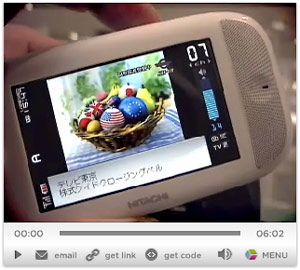 Despite all the effort WWJ has put into finding and covering software developers that have successfully transitioned out of Japan’s navel-gazing mobile market to markets elsewhere, I must admit we haven’t found thousands. Or even dozens. But one of them is Shinjuku, Tokyo-based G-mode, and this week the Japanese mobile game maker and its Dublin, Ireland-based partner Upstart Games said four IQ-enhancing games, already popular in Japan, would be distributed in the US and Europe via Upstart. The news underscores the profits to be found when forward-thinking mobile players work hard to bridge the wireless culture divide.
Despite all the effort WWJ has put into finding and covering software developers that have successfully transitioned out of Japan’s navel-gazing mobile market to markets elsewhere, I must admit we haven’t found thousands. Or even dozens. But one of them is Shinjuku, Tokyo-based G-mode, and this week the Japanese mobile game maker and its Dublin, Ireland-based partner Upstart Games said four IQ-enhancing games, already popular in Japan, would be distributed in the US and Europe via Upstart. The news underscores the profits to be found when forward-thinking mobile players work hard to bridge the wireless culture divide.
Upstart’s CEO Barry O’Neil told WWJ that the company has been planning to launch a brain training game for mobile since the runaway success of the genre in Japan late last year. Ironically, the Irish side was initially skeptical that such a narrow niche could win operator interest in Europe or the US. “We’ve a relationship with G-mode dating back to last year, and their Right Brain Paradise was something we’d looked at in the past, but felt gaining operator support could be difficult. Now that the genre is becoming more widely known we felt the time was right to introduce this mobile series,” he wrote in an email yesterday.
The three-game series, dubbed, “I.Q. Academy” is intended to help get players’ brains in shape by offering games designed to exercise the brain’s right side and improve spatial, visual and cognitive skills in the player. I.Q. Academy is based on G-mode’s hyperpopular ‘Right Brain Paradise’ series, which, according to the company, has sold almost two million downloads. The series is expected to launch in Europe and the US in the coming months (WWJ subscribers log in for full article).


 NHK and five commercial TV broadcasters held a splashy launch party in Tokyo’s central Shinjuku train station on Saturday afternoon, announcing the official start of terrestrial ‘One-Seg’ broadcast services. The carriers have lined up accordingly: NTT DoCoMo has partnered with Nippon Television and Fuji Television, while KDDI has forged a partnership with TV Asahi.
NHK and five commercial TV broadcasters held a splashy launch party in Tokyo’s central Shinjuku train station on Saturday afternoon, announcing the official start of terrestrial ‘One-Seg’ broadcast services. The carriers have lined up accordingly: NTT DoCoMo has partnered with Nippon Television and Fuji Television, while KDDI has forged a partnership with TV Asahi. Despite all the effort WWJ has put into finding and covering software developers that have successfully transitioned out of Japan’s navel-gazing mobile market to markets elsewhere, I must admit we haven’t found thousands. Or even dozens. But one of them is Shinjuku, Tokyo-based
Despite all the effort WWJ has put into finding and covering software developers that have successfully transitioned out of Japan’s navel-gazing mobile market to markets elsewhere, I must admit we haven’t found thousands. Or even dozens. But one of them is Shinjuku, Tokyo-based  For Vodafone Japan, the end came not with a bang, but with a whimper. When we arrived at last Monday’s press event – the final one, it turned out, before news of the Japan sell-out hit the Web – the smell of pending doom hung in the air. Ironically, the media briefing bore an optimistic title: the “Future Direction of Product & Service Development.” It was also surprising to see that President Bill Morrow and Chairman Tsuda-san would attend for the 3G roadmap briefing to be given by former J-Phone super-star Ohta-san; WWJ has never seen three Vodafone Big Guys in one room together for a media briefing (perhaps there is safety in numbers)? But when the talk from all three turned out vague and totally avoided any mention of new MVNO’s signing up to resell Vodafone 3G capacity — widely considered to be one of Big Red’s few viable options in Japan — we suspected something was up.
For Vodafone Japan, the end came not with a bang, but with a whimper. When we arrived at last Monday’s press event – the final one, it turned out, before news of the Japan sell-out hit the Web – the smell of pending doom hung in the air. Ironically, the media briefing bore an optimistic title: the “Future Direction of Product & Service Development.” It was also surprising to see that President Bill Morrow and Chairman Tsuda-san would attend for the 3G roadmap briefing to be given by former J-Phone super-star Ohta-san; WWJ has never seen three Vodafone Big Guys in one room together for a media briefing (perhaps there is safety in numbers)? But when the talk from all three turned out vague and totally avoided any mention of new MVNO’s signing up to resell Vodafone 3G capacity — widely considered to be one of Big Red’s few viable options in Japan — we suspected something was up.